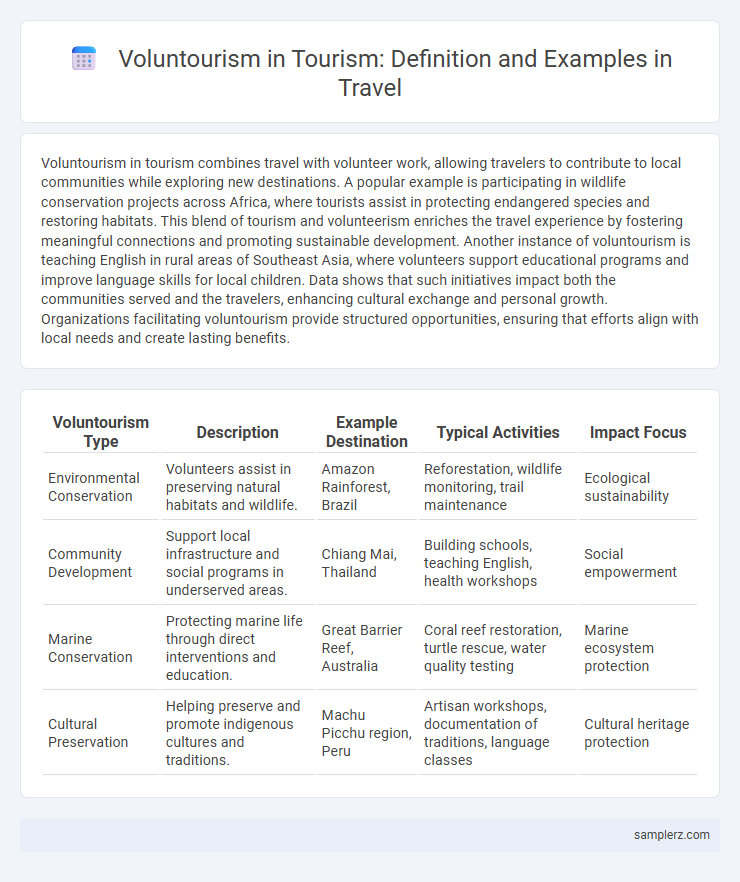Voluntourism in tourism combines travel with volunteer work, allowing travelers to contribute to local communities while exploring new destinations. A popular example is participating in wildlife conservation projects across Africa, where tourists assist in protecting endangered species and restoring habitats. This blend of tourism and volunteerism enriches the travel experience by fostering meaningful connections and promoting sustainable development. Another instance of voluntourism is teaching English in rural areas of Southeast Asia, where volunteers support educational programs and improve language skills for local children. Data shows that such initiatives impact both the communities served and the travelers, enhancing cultural exchange and personal growth. Organizations facilitating voluntourism provide structured opportunities, ensuring that efforts align with local needs and create lasting benefits.
Table of Comparison
| Voluntourism Type | Description | Example Destination | Typical Activities | Impact Focus |
|---|---|---|---|---|
| Environmental Conservation | Volunteers assist in preserving natural habitats and wildlife. | Amazon Rainforest, Brazil | Reforestation, wildlife monitoring, trail maintenance | Ecological sustainability |
| Community Development | Support local infrastructure and social programs in underserved areas. | Chiang Mai, Thailand | Building schools, teaching English, health workshops | Social empowerment |
| Marine Conservation | Protecting marine life through direct interventions and education. | Great Barrier Reef, Australia | Coral reef restoration, turtle rescue, water quality testing | Marine ecosystem protection |
| Cultural Preservation | Helping preserve and promote indigenous cultures and traditions. | Machu Picchu region, Peru | Artisan workshops, documentation of traditions, language classes | Cultural heritage protection |
Top Voluntourism Destinations for Meaningful Travel
Top voluntourism destinations include Peru, where travelers can assist in community development projects or conservation efforts in the Amazon rainforest. In Kenya, visitors participate in wildlife preservation and support local schools, fostering cross-cultural connections. Southeast Asia, particularly Thailand and Cambodia, offers opportunities to teach English and contribute to sustainable tourism initiatives in rural villages.
Wildlife Conservation Voluntourism Projects
Wildlife conservation voluntourism projects offer travelers hands-on experiences supporting endangered species protection and habitat restoration in regions like Africa's savannas, Southeast Asia's rainforests, and the Amazon Basin. Participants engage in activities such as monitoring animal populations, anti-poaching patrols, and wildlife habitat rehabilitation, simultaneously advancing conservation goals and promoting sustainable tourism. These projects enhance local biodiversity preservation efforts while providing authentic cultural exchange opportunities with indigenous communities involved in conservation.
Community Development Voluntourism Experiences
Community development voluntourism experiences often involve travelers partnering with local organizations to build infrastructure, improve education, and support healthcare initiatives. Projects may include constructing schools, facilitating vocational training, or aiding in sustainable agriculture to enhance residents' quality of life. Such programs foster cultural exchange while empowering communities through active collaboration and resource sharing.
Environmental Protection Volunteer Opportunities Abroad
Environmental protection volunteer opportunities abroad offer travelers unique chances to contribute to conservation projects such as reforestation, wildlife monitoring, and marine ecosystem restoration. Participants collaborate with local organizations to preserve endangered habitats while gaining hands-on experience in biodiversity preservation and sustainable tourism practices. These voluntourism programs promote ecological awareness and foster global cooperation in combating environmental challenges.
Teaching and Education Voluntourism Programs
Teaching and education voluntourism programs offer travelers the opportunity to contribute to local communities by providing essential educational support, such as English language instruction and literacy tutoring. These initiatives often take place in underprivileged regions where access to quality education is limited, allowing volunteers to make a significant social impact. Popular destinations for education-focused voluntourism include countries like Nepal, Kenya, and Cambodia, where cultural exchange and skill development are integral to the experience.
Sustainable Agriculture Voluntourism Initiatives
Sustainable agriculture voluntourism initiatives involve travelers actively participating in eco-friendly farming practices that promote soil health, biodiversity, and organic cultivation. These projects, such as helping on regenerative farms or community gardens in countries like Costa Rica or Thailand, support local food systems while reducing environmental impact. Participants gain hands-on experience in sustainable techniques, contributing to rural livelihoods and cultural exchange.
Marine Conservation Voluntourism Adventures
Marine conservation voluntourism adventures enable travelers to actively participate in protecting coral reefs, monitoring marine species, and restoring ocean habitats while gaining hands-on scientific experience. Programs such as sea turtle nesting surveys, underwater cleanups, and sustainable fishing education empower volunteers to contribute directly to biodiversity preservation and ecosystem health. These immersive opportunities combine adventure tourism with environmental stewardship, fostering a deeper understanding of marine conservation challenges worldwide.
Healthcare and Medical Voluntourism Roles
Healthcare and Medical Voluntourism roles often include providing basic medical care, conducting health education workshops, and assisting in clinics or hospitals in underserved regions. Volunteers with medical expertise support vaccination campaigns, maternal health programs, and disease prevention initiatives to improve community health outcomes. This form of voluntourism combines travel with meaningful contributions to global healthcare access and capacity building.
Cultural Exchange through Voluntourism
Voluntourism fosters cultural exchange by enabling travelers to engage directly with local communities through projects such as teaching languages, participating in traditional crafts, or supporting sustainable agriculture. These immersive experiences promote mutual understanding and respect, enriching both volunteers and hosts by sharing traditions, values, and daily life. Programs like helping refurbish historic sites in Peru or assisting in conservation efforts in Kenya exemplify how voluntourism bridges cultural gaps while contributing positively to tourism development.
How Voluntourism Supports Local Economies
Voluntourism drives local economies by generating income through lodging, food, and transportation services utilized by volunteers. Engaging in community projects such as building schools or supporting agriculture enhances skill development and creates sustainable employment opportunities. Local artisans and markets benefit from increased demand, fostering cultural exchange while boosting economic resilience.

example of voluntourism in tourism Infographic
 samplerz.com
samplerz.com